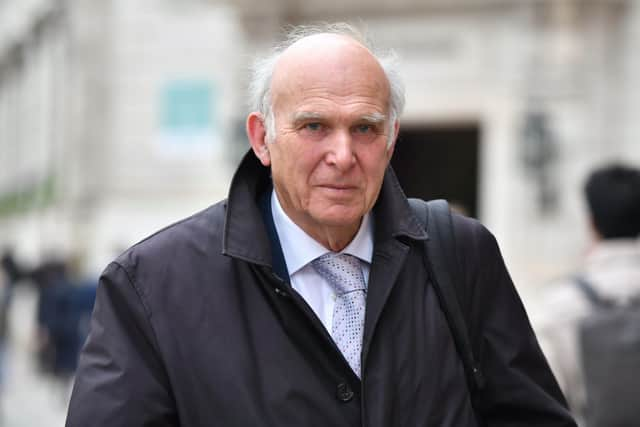Proposals to give regulators an objective to promote ‘international competitiveness’ would leave us on a slippery slope - Sir Vince Cable
The change was breezily unveiled by Economic Secretary to the Treasury Andrew Griffith, stating simply "the government has decided not to proceed with the intervention power at this time”, and that “we remain committed to the operational independence of the financial services regulators."
The brevity of this statement disguises the reality of another major U-turn from the young Sunak government. As recently as September, the Prime Minister was so committed to the necessity of these powers he was publicly declaring his support. It also failed to acknowledge that the climb down was the result of overt and sustained opposition from the Bank of England and others in recent weeks.
Advertisement
Hide AdAdvertisement
Hide AdThe Labour Party was quick to welcome the government’s change of heart, asserting that they “should never have been threatening the independence of financial service regulators”.


It’s certainly true that the last thing that the battered and vulnerable reputation of the UK economy needed at this stage was more reason for international scepticism of its reliability as a place to invest and do business.
And yet for all these warm words from both parties about the importance of independent regulation, they are directly contradicted by their shared stance on another proposed change to financial rules, one that unlike call-in is still going ahead, and indeed is close to being made law.
Direct government intervention is one threat to independent regulation. Another of equal if not greater significance is when a regulator's rules and remit are changed so that rather than acting as a dispassionate watchdog, they are forced to act according to the commercial interests of the firms they are supposed to oversee.
Advertisement
Hide AdAdvertisement
Hide AdThis is exactly what is about to happen through the Financial Services and Markets Bill (now proceeding through the Lords), which proposes to give regulators an objective to promote ‘international competitiveness’ of the sector they are meant to police.
‘Competitiveness’ is often (and sometimes intentionally) conflated with ‘competition’, or the healthy contest between firms in a market.
In contrast, what chasing ‘competitiveness’ really means in practice is a race to the bottom - watering down standards in the hope of attracting more dubious sources of money to an industry.
The dangers of this should be obvious. Similar principles and approaches were behind the 2008 crash, which hammered growth and incomes, and from which our economy is still recovering, ‘Competitiveness’ was specifically removed from financial regulation in 2012 as a result.
Advertisement
Hide AdAdvertisement
Hide AdAs the current Governor of the Bank of England has said: the regulator “was required to consider the UK’s competitiveness, and it didn’t end well, for anyone”.
Retrying this failed experiment at a time when public and household finances are already under unprecedented pressure is extraordinarily foolish. As Martin Wolf has put it so well “the mantra of competitiveness will start the journey down a dangerously slippery slope”.
The proposal has generated opposition. Over 50 economists wrote a letter to the government explaining how compromising regulation of finance in this way would undermine the growth and stability of the UK economy, politicians from every party (including Yorkshire’s BEIS Minister Kevin Hollinrake) and the Treasury Select committee have gone on record against the changes, and a coalition of civil society organisations has formed to oppose them.
But so far, given the great damage that these changes could cause, there has still been relatively little public awareness and debate, let alone real sustained political pushback.
Advertisement
Hide AdAdvertisement
Hide AdWhile the Government and Labour might be squarely at odds on many issues, on this one they are seemingly united in their mistaken belief that removing regulation will promote growth, rather than undermine it - a mutual commitment to forget the lessons of 2008.
We might expect this from a governing Conservative Party that is clearly in desperate straits, 20 points behind in the polls and casting around for a means to finally create sustained growth after years of failure.
But it is truly disappointing to see that Labour, in a seeming desire to appear ‘pro-business’, has declared it ‘strongly welcomes’ and supports the objective.
As the bill begins to be debated by the Lords in the new year, there is one last chance to see the risks that making regulators beholden to ‘competitiveness’ would cause for us all, and place the proposals where they belong - alongside ‘call-in’ in the dustbin of history. Let us all hope that chance is taken.
Sir Vince Cable is the former leader of the Liberal Democrats.